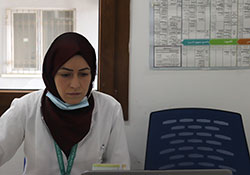Rahaf Kak, 33 years old, doctor in Hatay

WHO
Rahaf Kak came to Turkey in 2013, after finishing her paediatrics internship in Syria. She did not know whether she would be able to use her medical training in her new country. Then she heard about the Refugee Health Training Programme through an instant messaging app group composed of Syrian doctors living in Turkey.
Rahaf rushed to have her medical certificate and other documents translated and sent to Gaziantep, Turkey. She was accepted into the Programme, and today she is the only female doctor working at the Hatay Refugee Health Training Centre.
She believes the Refugee Health Training Centres have a positive effect on refugees’ lives. “In this clinic, we can find all the technical equipment needed for primary health care,” she says. “It is a really good opportunity for patients.”
The Refugee Health Training Centres not only tend to the physical health needs of Syrian refugees; they also offer psychosocial support. “The living conditions in Turkey are better for Syrian refugees than they were back home, and this makes it easier to deal with their post-traumatic stress disorder,” says Rahaf. “Nonetheless, sometimes parents want to talk with me about their traumatic experiences. I try to direct them to the psychological support team.”
Rahaf also sees many cases of child marriage among Syrian refugees and tries to talk with these girls about their situation. “Education is the only weapon to fight bad conditions,” she says.
The Refugee Health Training Programme
In 2016, the Public Health Institution of Turkey, associated with the Ministry of Health, and the WHO Country Office in Turkey developed adaptation training for Syrian health workers living in Turkey – including doctors, nurses and midwives.
WHO supports the classroom portion of the training, in collaboration with the Ministry of Health, and is committed to ensuring that Syrian health professionals are equipped with the essential theoretical background for their future careers. In addition, WHO provides trainees with financial support for the duration of the practical training to cover living expenses and travel costs. The initiative is supported financially by European Civil Protection and Humanitarian Aid Operations (ECHO).
As of December 2017, more than 1000 Syrian doctors had participated in the theoretical courses; 639 had completed the practical courses; and 289 had received vocational competence certificates and were actively working in Refugee Health Training Centres. Of these doctors, 25% are female.



